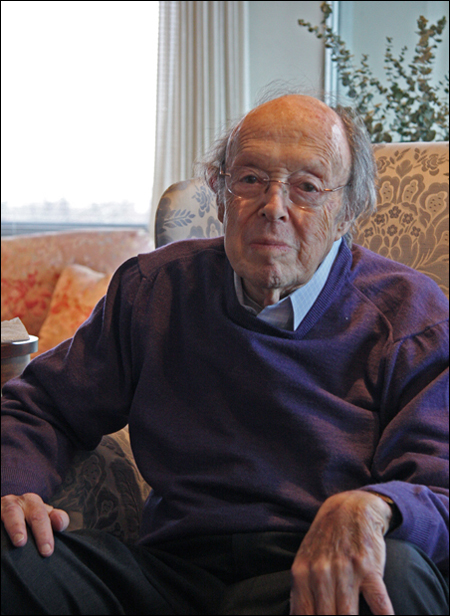Anthony Lewis, a former New York Times reporter and columnist, author, and longtime advocate for free speech and justice, has died at the age of 85. A Nieman Fellow in the class of 1957, Lewis was a constitutional law expert whose groundbreaking coverage of the Supreme Court changed the way complex legal matters are reported in the United States.
In January, Lewis’s Harvard classmate Stanley Karnow, a 1958 Nieman Fellow, died. Although Lewis was already in poor health himself, he invited Nieman Reports’s Jonathan Seitz to his home to speak about his old friend, from their days working together on the Harvard Crimson to their regular meetings and phone calls later in life. As Lewis said of Karnow, “But what I realized with his death is that I must have had, somewhere in the back of my mind, the notion that he was immortal. We all die. And I’m 85, not far off him.”

Anthony Lewis at his home in Cambridge, Massachusetts in January 2013. Photo by Jonathan Seitz
Nieman Reports has collected some speeches and articles by Anthony Lewis published in the magazine since 1960:
The Responsibilities of a Free Press
Summer 2004
“Since the terrorist attacks of September 11, 2001, the government has not directly engaged the press. It has not sought to enjoin a
newspaper or broadcast station from disclosing something. It has invoked national security, rather, to deprive individuals of fundamental rights. In the name of fighting terrorism, it has abruptly overridden guarantees in the Constitution and international law. Ideas that we had regarded as alien to American beliefs—detention without trial, denial of the right to counsel, years of interrogation in isolation—are now American practice.”
The Press Paid Little Attention When the Immigration Act Was Passed
Winter 2002
During a five-year period Lewis wrote several dozen columns about the 1996 Asylum and Immigration Act and its consequences. “Did the columns make a difference? I think they helped to create understanding of how harsh immigration procedures could be. During the time I was writing these columns, the INS did try to moderate the most senseless actions. Many individuals about whom I wrote were not helped: They remain expelled and excluded.”
The Critical Role of the Press: Issues of Democracy [PDF]
Spring 1984
“… more is involved in the First Amendment speech and press clauses than the value of self-expression, important as that is: the right of the soapbox orator or the editor to speak his mind. The working of our political system is involved. For the premise of that system—the Madisonian premise—is that free debate on public issues, however inconvenient it may be for the ruler of the day, improves public policy.”
Originally published in Spring 1980
“Nowadays the American press feels unloved, especially by judges. Cases decided in the last few years have left many editors and reporters with an acute sense of living under threat from the law. One of those cases involved Myron Farber, a New York Times reporter who was jailed for contempt when he refused to produce his notes for possible use by the defendant in a murder trial.”
(Not So) At Home Abroad: Its Drawbacks for the Press [PDF]
Winter 1972/Spring 1973
“What happened to Harry Evans in his coverage of the thalidomide case should be noted by any American editor, reporter or citizen who takes freedom of the press lightly. He ran into the British legal doctrine of contempt of court.”
Newspapermen and Lawyers [PDF]
July 1960
“As my concern is public responsibility in our professions, I want to focus especially on Washington. In that city, I think, lawyers and newspapermen do share a basic motivation and joy in life. Charles A. Horsky, in his book, ‘The Washington Lawyer,’ called it ‘an intimate sense of participation in significant affairs.’ Douglass Cater, in a book which referred to the press in Washington as ‘The Fourth Branch of Government,’ spoke of correspondents having a ‘heady sensation of power and participation.’”

